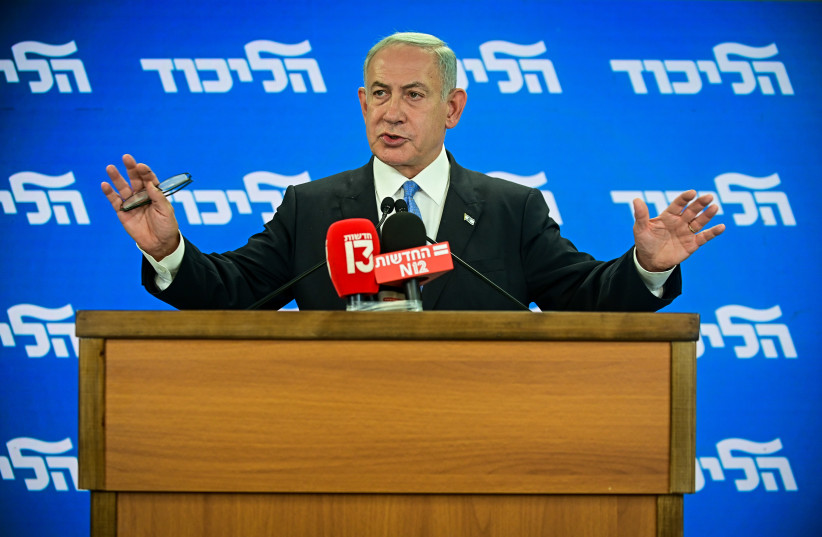The US is going to the polls in November for midterm elections, and until the Supreme Court’s Dobbs decision eliminating federal abortion rights protections last June, it looked as if the Democrats would be in for a drubbing.
Back then there was talk of the Democrats losing both the House and the Senate, which they control today, to the Republicans.
Why?
Because the US economy is in the doldrums. High inflation, high gas prices, high interest rates, high housing costs, and a tumbling stock market. The No. 1 issue on the mind of US voters in election years is, ordinarily, the economy. If the economy is doing poorly, the party in power suffers.
The Dobbs decision, however, threw a wrench into the works because abortion is such an emotional issue; and the court’s decision, at least in the polls, has given the Democrats new life. While four months ago it appeared as if they would get clobbered, today nothing is certain.
That’s in the US.
In Israel, where the macroeconomic situation might be better than in the US but the situation facing every family is increasingly difficult, one would think that the poor economic indicators here as well – high food prices, runaway housing costs, and high gas and electric bills – would also register with the voters.
One might have thought that with the economic situation what it is, and with everyone complaining about it as they do, the economy would be moving the dial in the polls in Israel, and those currently in power would be facing a voter backlash. But one would have been wrong.
The polls are showing that the stalemate between the pro-Netanyahu camp and the anti-Netanyahu camp remains, and neither side will – without parties from the other camp joining them – be able to form a government with even a slim majority.
What is interesting here is that it seems to run against what people are telling pollsters. In a recent Israel Democracy Institute poll, 31% of the respondents said that the economic platform of a party would determine whether they would vote for it, which puts the economy and not the person heading the party nor security and foreign policy issues at the top of their list of priorities.
What is the determining factor of the Israeli elections?
Nevertheless, the stalemate remains, meaning that it is still the identity of the person leading the party – namely Benjamin Netanyahu – that is the determining factor in the election. Not inflation, not the prohibitive cost of buying an apartment, not outrageous food prices. Netanyahu.
The last four elections have been about Netanyahu, and neither the polls nor the campaign rhetoric is indicating it will be any different this time.

Economic and social issues, as always, have taken a backseat to Yesh Atid and the National Unity Party warning of the dire straits that await the country if Netanyahu is elected, and the Likud predicting doom if Lapid returns to the Prime Minister’s Office, or Gantz somehow manages to sneak in.
Granted, Shas is running on a platform of feeding the hungry; a loud party called Fiery Youth, headed by TikTok sensation Hadar Muchtar – someone not yet old enough to serve in the Knesset – is screaming about the price of buying an apartment; and Netanyahu is putting up one post after the next on social media promising policies he never pursued in his 12 years in office from 2009 to 2021. But all that is being drowned out by the question that has gripped the country since April 2019, the first election in this unending cycle: is Netanyahu suited to serve?
One of Israel’s numerous anomalies is the extent to which economic issues seldom dominate the country’s agenda during an election campaign, always overtaken by issues of war and peace.
The outgoing government had a chance to change that narrative but let it slip through its fingers.
The ideological differences separating the eight coalition parties in the current government prevented it from being able to tackle issues that have long dominated Israel’s political discourse: settlements, Jerusalem, and the Palestinians.
Since the parties could not agree on those issues, they could have focused on economic issues, where there was far more agreement. The government could have taken aggressive action to tackle deeply ingrained practices, such as too much of the Israeli economy in the hands of too few, which drive up prices, and made that its legacy issue.
Shortsightedly, however, it did not, preferring to bicker itself into oblivion.
Had the ministers not done so, had they pursued structural change in the economy, they could have run on a ticket heralding economic achievements. But with the economy in its current state, why would those who have been in charge of the economy for the last year want to turn it into a campaign issue? Why even bring it up?
So the economy ceases to become a central campaign issue, less because people are not interested and more because the parties do not want to make it an issue. That then leaves the parties arguing about what they have argued about for the last three-and-a-half years: Netanyahu, yes or no.
